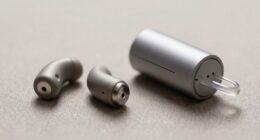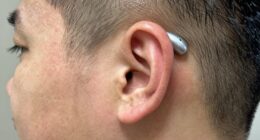Embarking on a journey to enhance our hearing health is similar to planting seeds of resilience in the sensory garden. By investigating the various supplements created to address hearing loss and tinnitus, a plethora of choices become available to us.
Each supplement holds the promise of relief and restoration, inviting us to explore a path towards improved ear health. Let's uncover the potential benefits these top 7 supplements offer and discover how they may hold the key to a harmonious symphony of sound in our lives.
Key Takeaways
- Antioxidants and vitamins like A, C, and E protect inner ear cells from damage.
- Minerals such as potassium and zinc are essential for nerve health and combating hearing issues.
- Omega-3 fatty acids aid in reducing inflammation and protecting against age-related hearing loss.
- Magnesium supports nerve health and may provide relief from tinnitus symptoms.
Antioxidants for Hearing Health
Antioxidants, such as vitamins A, C, and E, play a vital role in safeguarding inner ear cells from damage caused by free radicals. These powerful compounds serve as protectors of our hearing health by neutralizing the harmful effects of free radicals, unstable molecules that can harm cells in the inner ear. Vitamin C, in particular, not only acts as an antioxidant but also supports the immune system, contributing to overall ear health. By incorporating foods rich in antioxidants into our diet, we can potentially reduce the risk of inner ear cell damage and slow down age-related hearing decline.
Maintaining adequate levels of antioxidants through a balanced diet or supplements can be beneficial in preserving our hearing abilities. By protecting the integrity of inner ear cells, antioxidants can potentially reduce the onset of conditions like tinnitus and age-related hearing loss. Prioritizing antioxidant-rich foods and supplements is a proactive step towards promoting optimal hearing health and ensuring the longevity of our precious sense of sound.
Essential Vitamins for Tinnitus Relief

To further support tinnitus relief, exploring the role of essential vitamins in promoting inner ear health is crucial. When it comes to tinnitus and hearing health, incorporating specific vitamins into your daily routine can help reduce symptoms and support overall well-being. Here are some essential vitamins that may aid in tinnitus relief:
- Vitamin B12: Linked to relieving tinnitus symptoms by supporting nerve health and myelin production.
- Vitamin C: Crucial for maintaining inner ear cell health and immune function, but high intake should be limited to avoid increasing the risk of hearing loss.
- Folate: Essential for inner ear health, slowing age-related hearing decline, and combating free radicals that can impact blood flow to the ears.
Ensuring a sufficient intake of these vitamins, along with a balanced diet, may contribute to reducing tinnitus symptoms and supporting inner ear health. Remember, it's always best to consult with a healthcare professional before making significant changes to your supplement regimen.
Mineral Supplements for Hearing Loss
Potassium, magnesium, and zinc are essential mineral supplements that play a crucial role in supporting hearing health and potentially reducing the risk of tinnitus and age-related hearing loss. Potassium is vital for converting sound into nerve impulses and maintaining proper inner ear fluid function. Magnesium is associated with combating tinnitus and hearing loss by protecting nerves in the inner ear, especially after noise exposure. Zinc supports the immune system, fights ear infections, and may aid in managing tinnitus and sudden hearing loss.
| Mineral | Role in Hearing Health |
|---|---|
| Potassium | Conversion of sound into nerve impulses, inner ear function |
| Magnesium | Combating tinnitus and protecting inner ear nerves |
| Zinc | Supports immune system, fights infections, aids tinnitus |
Ensuring adequate levels of these minerals is crucial for preventing age-related hearing loss and maintaining overall hearing health. Low levels of potassium, magnesium, and zinc are linked to impaired hearing and age-related hearing loss resistance. Incorporating these mineral supplements into your diet can help support your hearing and potentially alleviate conditions such as tinnitus.
Omega-3 Fatty Acids for Tinnitus

Omega-3 fatty acids offer potential relief for individuals experiencing tinnitus by targeting inflammation in the inner ear and supporting overall ear health. Incorporating omega-3 rich foods like fish, flaxseeds, and walnuts in your diet can provide natural sources of this essential fatty acid.
Studies suggest that omega-3 fatty acids can help improve blood flow to the ear, aiding in the maintenance of ear health. These supplements may also play a role in protecting against age-related hearing loss and preserving auditory function. Before starting omega-3 supplements, it's advisable to consult with a healthcare provider to ensure they align with your individual health needs.
Zinc: A Key Supplement for Hearing
Zinc plays a critical role in maintaining optimal hearing health, as it's essential for inner ear function and nerve health.
The benefits of zinc supplementation extend to supporting the immune system, combating ear infections, and potentially alleviating symptoms of tinnitus and sudden hearing loss.
Recommended zinc dosages can vary based on individual needs and should be considered as part of a comprehensive approach to promoting overall ear health.
Zinc and Hearing Health
A key mineral crucial for maintaining inner ear health and nerve function is zinc, known for its role in supporting immune function and combating tinnitus and sudden hearing loss. When it comes to hearing health, zinc plays a vital role in several ways:
- Supports immune function.
- Helps combat tinnitus and sudden hearing loss.
- Maintains inner ear health and nerve function.
Ensuring adequate zinc intake is essential for overall well-being, especially in relation to hearing. Zinc supplements have shown promise in improving hearing health and reducing the severity of tinnitus symptoms. However, it's important to consult with a healthcare provider before incorporating zinc supplements into your routine to determine the appropriate dosage and ensure effectiveness for your hearing health.
Benefits of Zinc
Exploring the significance of incorporating zinc as a key supplement for hearing health reveals its crucial role in supporting overall well-being and combating various auditory challenges. Zinc deficiency has been linked to impaired hearing and age-related hearing loss resistance. Additionally, zinc is essential for supporting the immune system and fighting ear infections. Studies suggest that zinc supplementation may help combat tinnitus and sudden hearing loss. Low levels of zinc in the body are associated with hearing problems and age-related decline. Including zinc-rich foods in the diet or taking zinc supplements can support ear health and potentially alleviate hearing issues.
| Benefits of Zinc | Examples |
|---|---|
| Supports immune system | Zinc helps fight ear infections |
| Combats tinnitus | May alleviate sudden hearing loss |
| Aids in age-related hearing loss | Essential for overall well-being |
Zinc Dosage Recommendations
Understanding the appropriate dosage of zinc is crucial when considering it as a key supplement for hearing health. When it comes to zinc supplementation, here are some important points to keep in mind:
- Recommended daily zinc intake for adults is 8-11 mg for women and 11 mg for men.
- Excessive zinc intake can lead to adverse effects like nausea, vomiting, and diarrhea.
- Zinc deficiency may contribute to hearing loss, making supplementation beneficial for some individuals.
It is essential to consult a healthcare provider to determine if zinc supplementation is suitable for your specific hearing health needs. When taken as directed, zinc may not only support overall ear health but also potentially aid in managing tinnitus symptoms.
Magnesium Benefits for Tinnitus

When considering magnesium benefits for tinnitus, it's crucial to understand how this essential mineral can impact symptoms like sleep disturbances and stress levels. Research supports the role of magnesium in reducing anxiety, which can be a contributing factor to tinnitus.
Exploring the appropriate dosage and scientific evidence on the effectiveness of magnesium in managing tinnitus is essential for individuals seeking relief from this condition.
Magnesium and Tinnitus
Magnesium's role in supporting nerve health in the inner ear makes it a crucial element in combating tinnitus and maintaining overall hearing function. When it comes to tinnitus relief, magnesium stands out for its potential benefits. Here are some key points to consider:
- Magnesium aids in supporting nerve health in the inner ear.
- Research suggests that magnesium supplements may help reduce the perception of tinnitus.
- Maintaining adequate levels of magnesium is essential for protecting nerves in the inner ear and sustaining overall hearing function.
Incorporating magnesium-rich foods or supplements into your diet could be a valuable step towards addressing tinnitus symptoms and promoting better hearing health.
Dosage Recommendations
To optimize the potential benefits of magnesium for tinnitus relief, it is crucial to consider the recommended daily dosage ranging from 300 to 500 mg. Studies suggest that magnesium plays a role in nerve function and blood flow regulation, which may contribute to its potential relief for tinnitus symptoms. Consulting with a healthcare provider is recommended to determine the appropriate magnesium dosage for tinnitus management. Maintaining consistent magnesium intake within the recommended range is essential for potential relief. Below is a table summarizing the dosage recommendations:
| Dosage (mg) | Benefit | Potential Relief |
|---|---|---|
| 300 | Nerve Function Support | Mild Tinnitus Relief |
| 400 | Blood Flow Regulation | Moderate Tinnitus Relief |
| 500 | Enhanced Absorption | Significant Relief |
Research on Effectiveness
Recent research findings consistently highlight the potential effectiveness of magnesium supplementation in improving tinnitus symptoms by supporting sleep quality and enhancing brain health.
When considering magnesium for tinnitus management, it's essential to understand its role in hearing health and nerve function.
While scientific evidence supports the benefits of magnesium supplementation for overall wellness, its direct impact on tinnitus varies among individuals.
It's crucial to focus on evidence-based treatment options for effectively managing tinnitus symptoms.
Herbal Remedies for Hearing Support

Herbal supplements such as Ginkgo Biloba, Vinpocetine, and Coenzyme Q10 are commonly utilized to support hearing health by improving circulation, reducing inflammation, and providing antioxidant protection for the ears. While these herbal remedies are popular for their potential benefits in hearing support, scientific evidence backing their effectiveness remains limited.
Some studies suggest that these herbal supplements may aid in managing hearing loss and tinnitus by promoting overall ear function. However, it's crucial to consult a healthcare provider before incorporating herbal remedies into your routine to ensure both safety and efficacy.
Research on herbal supplements like folic acid and green tea extract, as well as their impact on hearing aids and tinnitus management, is ongoing. In the quest for optimal ear health, maintaining a healthy diet, supporting brain health, and seeking antioxidant protection are also vital components to consider alongside herbal remedies.
Stay informed about the latest findings from clinical trials to make well-informed decisions regarding your hearing support regimen.
Frequently Asked Questions
How Do You Treat Tinnitus and Hearing Loss?
We manage tinnitus and hearing loss through lifestyle adjustments, sound therapy, and professional guidance. Hearing aids with sound generators can help by amplifying external sounds.
FDA-approved tools and consultations with tinnitus specialists offer personalized strategies. Effective management doesn't always require dietary supplements, emphasizing evidence-based approaches.
What Is the Number One Supplement for Tinnitus?
When it comes to tinnitus relief, magnesium stands out as a top supplement choice for many. Its potential benefits in combating tinnitus and hearing loss make it a valuable option for managing these conditions.
Research suggests that magnesium can improve sleep quality, brain health, and overall hearing health. Maintaining optimal magnesium levels in the inner ear fluid is crucial for protecting nerves and supporting hearing function, making it a key player in tinnitus management.
What Is the New Tinnitus Treatment 2023?
We're excited to share that the new tinnitus treatment for 2023 combines advanced sound therapy and cognitive behavioral techniques.
This innovative approach aims to retrain the brain's response to tinnitus sounds for long-term relief.
Promising results from clinical trials show a significant reduction in tinnitus severity and improved quality of life.
Personalized care and ongoing support are key components of this treatment, leading to increased comfort, decreased stress, and better sleep quality for patients.
What Is a Natural Remedy for Hearing Loss and Tinnitus?
When it comes to natural remedies for hearing loss and tinnitus, we've found several options worth exploring. From magnesium's potential in combating tinnitus to zinc's ability to improve hearing function, there are various supplements that may offer relief.
Vitamin B-12 is essential for nerve health and could help reduce tinnitus severity, while omega-3 fatty acids support healthy ear function. Herbal supplements like Ginkgo biloba and Coenzyme Q10 are also believed to have benefits for hearing health.
Conclusion
In conclusion, these top 7 supplements offer promising benefits for individuals dealing with hearing loss and tinnitus. By incorporating antioxidants, essential vitamins, minerals, Omega-3 fatty acids, Zinc, Magnesium, and herbal remedies into your daily routine, you can support ear health and potentially alleviate symptoms.
Remember, a well-rounded approach to managing these conditions is key, so consult with your healthcare provider to determine the best supplement regimen for your needs. As the saying goes, 'An ounce of prevention is worth a pound of cure.'
"…so take care of your ears and prioritize their health to prevent any future issues."











